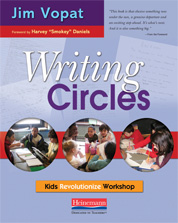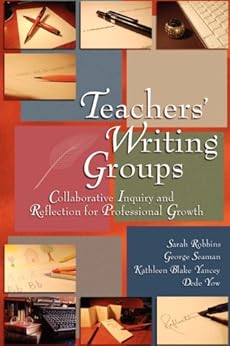 The Columbus Area Writing Project Summer Institute ended Friday.
The Columbus Area Writing Project Summer Institute ended Friday.We began as individuals with our personal goals, issues and concerns. We each brought our confidences and our talents, our frailties and our fears.
We carried this baggage to Kenyon College for the opening retreat of our summer institute.
There we weathered a tornado warning and serious storm.
There we began to build our writing community.
We have been together-- sharing our stories and our writing and our questions, learning, researching, crying, laughing, changing, and growing for the past 2 1/2 weeks.
We questioned our beliefs, challenged our long held stances, affirmed our work, considered many new resources, books, and ideas, and opened new doors-- as people and as educators.
But... now the summer institute is over.
What do we do today?
We write individually. Pages are filled by one.
But writing is often best shared, revised, and honored in community.
How do we develop and maintain that community?
The year I was a participating fellow in the Columbus Area Writing Project summer institute (2005), I did not want to lose this writing in community. How quickly, once introduced, this becomes a necessary part of life!
In the fall, back in my school, I addressed this new need in two ways---I began a teachers' writing group, as well as an after-school writing group for students. Both lasted four or five years and were extremely successful and fulfilling.
For several years CAWP also hosted writing happy hours throughout the year in which teacher consultants from various summer institute cohorts came together regularly to share food, drink.... and writing.
More recently, our CAWP inquiry group, having completed their research, culminating with a presentation at NCTE 2012, decided to continue to meet together, not as researchers, but in a new configuration--an ordinary (or extraordinary) writing group. They did not want to give up their community.
Writing communities can be formal --as part of established institutions, like those within writing projects or schools, or less formal--like those begun among colleagues or friends. They can be composed of young folks--like my after-school groups or classroom peer groups, or they can be adults of any age.
Jim Vopat reminds us in the introduction to his book of the long standing history and tradition of writing groups :
Writers, sharing and talking about what they have written with other writers has likely been happening for as long as people have been writing. As Ann Ruggles Gere puts it in Writing Groups: History, Theory and Implications, " Writers have always asked friends and colleagues for feedback" (1987,22). For famous authors as well as kids reading stories they've written to each other, there is something immensely satisfying in sharing writing and getting a response. ( p.3)
 Vopat's book, Writing Circles: Kids Revolutionize Workshop provides a great foundation on which to build if you are interested in starting writing groups with kids.
Vopat's book, Writing Circles: Kids Revolutionize Workshop provides a great foundation on which to build if you are interested in starting writing groups with kids.  For additional support with writing groups for kids, I have always relied on the series of books by Ralph Fletcher, as both texts for my student writers, as well as sources of writing ideas. Visit his web page to learn more about this set of books.
For additional support with writing groups for kids, I have always relied on the series of books by Ralph Fletcher, as both texts for my student writers, as well as sources of writing ideas. Visit his web page to learn more about this set of books.For adult groups, there are many resources that are helpful. I recommend my personal "writing teachers in my head": Natalie Goldberg, Georgia Heard and Bonnie Goldberg. Their books will provide enough ideas to keep a writing group going for years. See my previous related post, The Writer's Notebook Part 2 (Resources) for a more complete list of recommendations of resources that will support your writing groups.
The writing prompts I use for writing groups of both kids and adults usually come from my own book, Deeper Writing: Quick Writes and Mentor Texts to Illuminate New Possibilities. The ideas in this book can easily be adapted to fit your writing group's needs.
 And finally, if you are interested in teacher inquiry writing groups, Teachers' Writing Groups: Collaborative Inquiry and Reflection for Professional Growth by Sarah Robbins, George Seaman and Kathleen Blake -Yancey is an excellent resource.
And finally, if you are interested in teacher inquiry writing groups, Teachers' Writing Groups: Collaborative Inquiry and Reflection for Professional Growth by Sarah Robbins, George Seaman and Kathleen Blake -Yancey is an excellent resource.Today's Deeper Writing Possibilities
List people that you might want to include in your own writing group.What are the benefits in being a part of writing group? What might be disadvantages that my hinder your writing?
Write about your expectations for your writing group. You may also want to create a list of rules to assist your group in running smoothly. For example, there may be a limit on the length of pieces shared or how often each member shares or how topics for writing are selected.


Robin, you write about Kenyon College, "There we weathered a tornado warning and serious storm...."
ReplyDeleteYou forgot to add "ghost stories" that you told in addition to those of Kevin, and Danielle. I "weathered' those stories in addition to the storm and tornado warning.
Foster, You are right-- We always tell ghost stories at Kenyon. It is the place for writing...... and ghost stories..... and on two occasions, serious storms.
ReplyDeleteAs I recall you initiated the ghost stories by asking if we believed in ghosts :-)
Have a great summer!